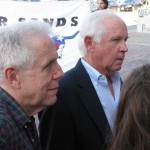TransCanada Faces Another Legal Challenge
- James Holland (left) and his brother David own property that they say has been in their family since the Civil War.
- Their land is just south of Beaumont.
- It’s crossed by more than 60 pipelines because it lies in a corridor linking refineries and fuel depots along the Gulf Coast.
- Their land is an area of coastal plains used for growing rice and hay and for grazing cattle.
- TransCanada Keystone Pipeline took the case to civil court at the Jefferson County Courthouse
- Judge Tom Rugg Sr. listens to arguments by TransCanada’s lawyer, Tom Zabel.
- Protestors from along the Keystone XL route, from North Texas and as far away as Montana, came to Beaumont in support of the Hollands.
Faced with landowners who’ve refused to sell access to their property, lawyers for TransCanada’s Keystone XL pipeline project—already under construction in Texas—told a judge in Beaumont that they’re doing only as the Texas legislature intended: using “eminent domain” and “condemnation” to gain access to private land over the protests of the landowners.
“The legislature came up with this scheme because they wanted to promote the development of oil and gas in the State of Texas,” said Tom Zabel, a Houston lawyer representing TransCanada. “Texas is the largest producing state in the nation. Why? Because the legislature has encouraged the production of oil and gas pipelines. Because you can’t have oil and gas production without pipelines.”
TransCanada went to Jefferson County Court Judge Tom Rugg Sr. seeking a “writ of possession,” a legal permission slip to gain access to land owned by Houston resident David Holland and his brother James. The siblings have some 4,000 acres of rice fields and pastureland just outside Beaumont. It’s land that’s already crossed by dozens of pipelines running up and down the Gulf Coast to refineries and storage depots.
TransCanada’s controversial Keystone XL pipeline would be one more, bringing crude down from Canada, West Texas and other points to the north to the refineries along the Texas coast. It’s controversial because some critics say the kind of heavy Canadian crude mined from the “tar sand” deposits in Alberta would pose an higher risk of leaks that would be more damaging to the environment than other crude oil.
Over the years, the brothers say they’ve generally had good relations with other companies, reaching financial deals to allow pipelines to cross their property.
“With all the pipelines that we have, there haven’t been condemnation threats until very recently. No one has pulled this one before,” James Holland told reporters outside the Jefferson County Courthouse.
Why the “threats”?
“To low ball us,” said James Holland.
“The bottom line is it’s all about money,” said David Holland. “We offered them the easement at a discount to fair market value but that wasn’t enough. They needed more of a discount.”
The Hollands have been here before: They fought a Texas-based company, Denbury Green Pipeline, and won a Texas Supreme Court ruling that said the company couldn’t use eminent domain.
But TransCanada argued that its case is different. For one, the company maintains that Keystone XL is a “common carrier” as required by Texas law, meaning that it will be used not just by TransCanada but other companies. And second, that the Supreme Court’s ruling in the Denbury case applied only to pipelines that carried what Denbury’s would: carbon dioxide.
Judge Rugg said he’d issue his ruling September 24.








